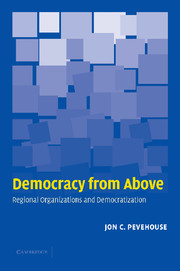Book contents
- Frontmatter
- Contents
- List of figures and tables
- Acknowledgments
- Abbreviations
- 1 Democratization and international relations
- 2 Regional organizations, the transition to and the consolidation of democracy
- 3 The supply-side of democratization and initial tests
- 4 Regional organizations and the transition to democracy
- 5 Regional organizations and the transition to democracy: evidence from cases
- 6 Regional organizations and democratic consolidation
- 7 Regional organizations and the consolidation of democracy: evidence from cases
- 8 Conclusion
- References
- Index
1 - Democratization and international relations
Published online by Cambridge University Press: 22 September 2009
- Frontmatter
- Contents
- List of figures and tables
- Acknowledgments
- Abbreviations
- 1 Democratization and international relations
- 2 Regional organizations, the transition to and the consolidation of democracy
- 3 The supply-side of democratization and initial tests
- 4 Regional organizations and the transition to democracy
- 5 Regional organizations and the transition to democracy: evidence from cases
- 6 Regional organizations and democratic consolidation
- 7 Regional organizations and the consolidation of democracy: evidence from cases
- 8 Conclusion
- References
- Index
Summary
Few events have captured the attention of policymakers and the public like the collapse of the Soviet Union and the emergence of independent states in Central and Eastern Europe. In the aftermath of these events, there was tremendous optimism when confronted with the prospects of how to create and preserve democracy in Central and Eastern Europe, Russia, and the former Soviet Republics. In the United States, the Clinton administration announced that the foreign policy doctrine of containment would be replaced with a doctrine of “enlargement” (Bloomfield 1994; Lake 1993; Smith 1994; Wiarda 1997). A major part of the enlargement strategy involved international support for democracy, often through regional organizations (cf. Christopher 1995). For example, the idea of regional institutions promoting and protecting democracy became a major justification for NATO expansion (cf. Albright 1997; Asmus, Kugler, and Larrabee 1993; Yost 1998).
Academic attention to the issue of transitions to and the survivability of democracy, including identifying conditions propitious for success, predated the events of 1989. The “third wave” of democratization spurred a considerable body of research examining the origins and consequences of these transitions, many of which occurred nearly fifteen years prior to the fall of the Berlin Wall (Huntington 1991; Shin 1994). Based on the lessons of Latin America, Southern Europe, and to a lesser extent Africa, the research provided the foundation from which to discuss the roadblocks to democratization in Eastern Europe as well as continued challenges to the future of democracy in other parts of the world.
- Type
- Chapter
- Information
- Democracy from AboveRegional Organizations and Democratization, pp. 1 - 14Publisher: Cambridge University PressPrint publication year: 2005
- 1
- Cited by



